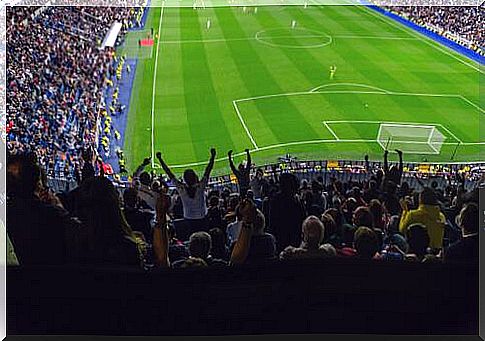How Does The Presence Of Others Affect Our Behavior?

How does the presence of others affect our behavior? Do you think we act the same way when someone is watching? Do you find that someone who judges or estimates us has the same effect as a simple bystander? Does the presence of others improve or harm your performance? Keep reading and discover the answers to these questions.
One of the first researchers to become interested in these questions was Norman Triplett. He confirmed that the presence of others improves our performance.
He conducted his experiments on cyclists. Triplett collected their data to compare the results of the training sessions on their own with those of training sessions with other cyclists.
Norman conducted yet another experiment that involved children. He found that working hours increased when children were with their peers. When they were alone, they worked more slowly.
These situations have proven that when you work together with your colleagues or with people who perform the same task as you, your performance improves. But what happens when those observers are just spectators?

Social facilitation and social inhibition
Social facilitation refers to how the presence of others helps us improve and perform better. When will this happen? This effect occurs when the command is easy for the person performing it. It also happens when the task does not require significant concentration and when the person can perform the task without complications.
The opposite effect is called social inhibition. When a person is unfamiliar with the assignment or when it requires a significant amount of concentration and involvement, the presence of others negatively affects performance.
These two effects are relevant when we focus on the task at hand. So it doesn’t matter if others judge our work or are just spectators. The type of task changes how we respond to their presence.
You can then make your own choice. Or you take advantage of the fact that someone is watching to do your best. Or you choose to work alone so you can focus on getting better at something. In this scenario, everything depends on the task.
Does the number of people watching play a role?
On this subject, researchers have conducted studies in the field of strength sports. They found that social facilitation occurs when there are fewer than ten spectators. Another finding was that there was no social facilitation or social inhibition when there were more than ten spectators.

This also has to do with the number of people watching. When ten or fewer people watch us, we can hear their comments and appreciate their gestures. This is what improves our skills. They exert an influence that changes the way we act.
When there is a large group of spectators, we lose control of the spectators. So we stop being sensitive to their influence.
Conclusion: Does the presence of others affect our behavior?
We can make the following decisions about the presence of others. It has to do with the kind of task ahead of us. When the task is easy, our performance improves. Our performance, on the other hand, diminishes when the task is complicated and requires more attention than usual.
The excessive activity that comes from the presence of others can distract our attention from the task. If it is a difficult task that we need to focus on, it is normal for the task to become more difficult if our attention is not focused. When others are around us, they can distract us.








